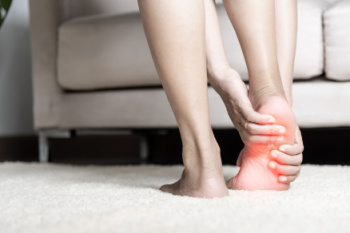
Diagnosing heel pain in adults starts with a detailed history and physical exam. A podiatrist will ask about when the pain started, what makes it worse, and if it is sharp, dull, or burning. Common causes include plantar fasciitis, Achilles tendinopathy, or heel spurs. The location of the pain, bottom, back, or sides of the heel, can offer important clues. Your doctor may check your gait, foot alignment, and flexibility. In some cases, imaging tests like X-rays or ultrasounds are used to look for structural problems or soft tissue injuries. Blood tests might be done if an inflammatory condition is suspected. Early diagnosis is key to effective treatment and can prevent chronic discomfort. If heel pain is interfering with your routine or worsening over time, it is suggested that you see a chiropodist for relief options
Heel pain is a common problem that can be caused by a variety of injuries, medical conditions, and other factors. If you suffer from heel pain, please consult with one of the chiropodists from Complete Family Footcare & Therapy. Our clinicians can help you maintain the health of your lower limbs and your mobility.
When it comes to heel pain, the exact location and type of pain are important to note. Some of the conditions that may cause heel pain include:
Plantar fasciitis - An inflammation of the ligament that runs along the bottom of the foot; it causes a stabbing pain under the heel that is at its worst when taking your first few steps after a long rest and while standing on your tiptoes or climbing stairs
Achilles tendonitis - An inflammation of the tendon in the back of the calf; it causes pain in the back of the heel that is at its worst after resting, as well as ankle and calf stiffness, swelling, and tenderness
Bone spurs - Bony lumps on the back of the heel bones that cause sharp pain upon first standing up; the pain becomes dull and achy over time
Heel fractures - A break or crack in the heel bone that causes pain, swelling, and difficulty walking
Retrocalcaneal bursitis - Swelling of the small, fluid-filled sac at the back of the heel bone; it causes pain, swelling, redness, and warmth in the back of the heel
Tarsal tunnel syndrome - Compression of the posterior tibial nerve which causes a pins and needles sensation in the heel, foot, and calf
Your chiropodist will be able to diagnose the underlying cause of your pain and prescribe the right treatments for you. If you have any questions, please feel free to contact our offices located in . We offer the newest diagnostic and treatment technologies for all your foot care needs.
